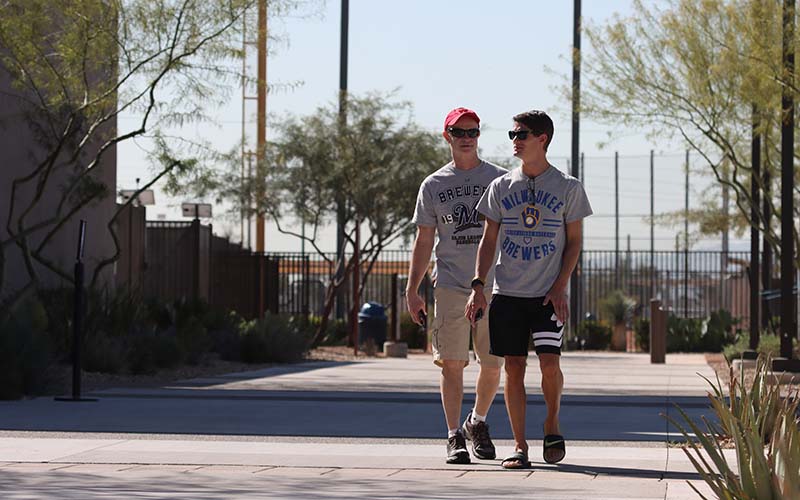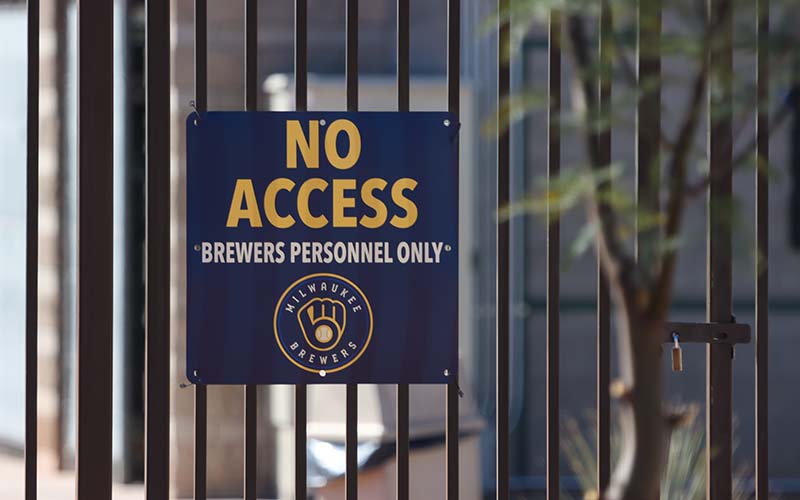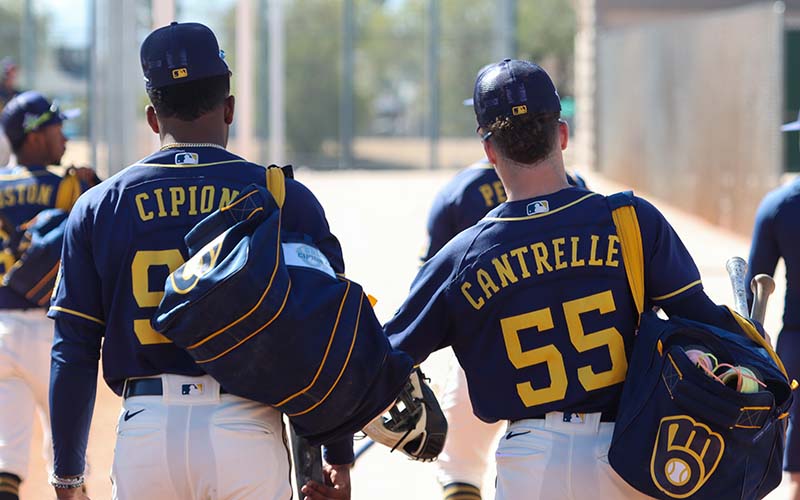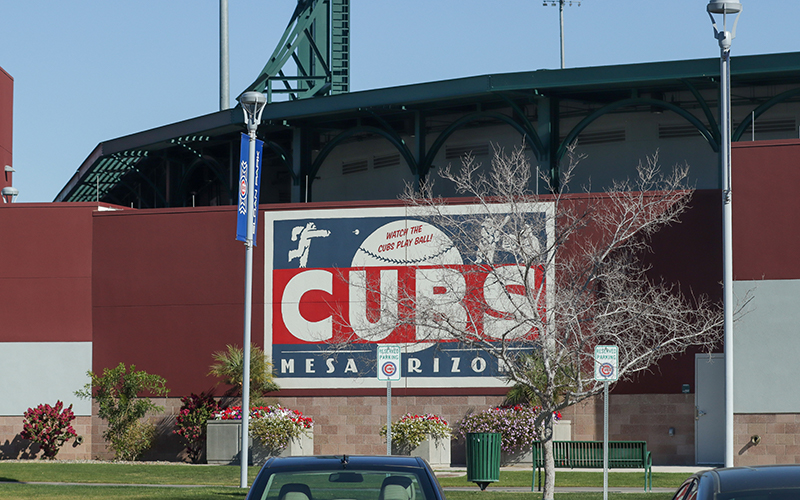PHOENIX – There won’t be a “Play Ball” on baseball’s Opening Day.
In what will be a hit to the Arizona economy and baseball fans throughout the Valley, Major League Baseball and the MLB Players Association could not come to an agreement on a new collective bargaining agreement by the league’s imposed deadline of 3 p.m. MST Tuesday. Commissioner Rob Manfred announced that the first two series of the regular season will be canceled and that spring training will also be delayed.
For followers of the Arizona Diamondbacks, the season was supposed to begin with three games in Milwaukee on March 31-April 2, followed by a three-game series against the Dodgers in Los Angeles. Now, the season would begin at home with a four-game set against the Padres – assuming that the two sides reach an agreement before more games must be canceled.
“The concerns of our fans are at the very top of our consideration list,” Manfred said. “I want to assure our fans that our failure to reach an agreement was not due to a lack of effort by either party.”
The MLBPA released a statement shortly following Manfred’s press conference.
“Rob Manfred and MLB’s owners have canceled the start of the season. Players and fans around the world who love baseball are disgusted, but sadly not surprised. … Against the backdrop of growing revenues and record profits, we are seeking nothing more than a fair agreement. What Rob Manfred characterized as a ‘defensive lockout’ is, in fact, a culmination of a decades-long attempt by owners to break our player fraternity. As in the past, the effort will fail. We are united and committed to negotiating a fair deal that will improve the sport for players, fans and everyone who loves our game.”

Paul Mueller (left) and his son await any sort of Brewers action. They made their way to Arizona from Oshkosh, WI. (Photo by Wesley Johnson/Cronkite News)
The deadline had been extended an extra day as both sides hoped to strike a deal. Instead, spring training will be further delayed and regular season games will be lost because of a collective bargaining impasse for the first time since 1995.
The MLBPA’s representatives are going back to New York, meaning no agreement is possible until at least Thursday, Manfred said. It means camps in Arizona’s Cactus League and the Florida Grapefruit League cannot open until at least March 8. The Diamondbacks’ website shows their first spring training game as March 12.
“Both sides are to blame for failing to come to an agreement,” Manfred said. “This is bad for our fans, our players and for our clubs.”
MLB made what it termed its “best and final” offer to the players union just before 2 p.m. MST. It included no changes to the Collective Balance Tax thresholds, which was one of the major controversies throughout negotiations, just a $5 million increase in the pre-arbitration bonus pool from $25 million to $30 million, and an increase of league minimums from $675,000 to $740,000. MLB.com insider Jon Heyman said the union’s request on the bonus pool was $85 million.
“I think you have to remember that the last five years have been very difficult years from a revenue perspective, given the pandemic,” Manfred said. “We have a payroll disparity problem, and to weaken the only mechanism in the agreement that is designed to promote some semblance of competitive balance, it’s not something the club group is prepared to do right now.”
In his statement to reporters Tuesday, Manfred said that MLB had also proposed eliminating shifts, adding a pitching clock and addressing players and fans concerns regarding issues like service time and competition.
Regarding service time for a shortened 2022 season, he also said that the league’s position is that the players won’t be paid for any games that are canceled.
The league also proposed an NBA-style draft lottery, which Manfred said would be the “most aggressive lottery in professional sports.”
In his address, he said that for the first time ever, MLB had agreed to eliminate draft pick compensation. They also offered that first and second place winners of the Rookie of the Year awards would earn a full year of service time, no matter when they are called up.
One of the most controversial issues discussed was the CBT, otherwise known as the luxury tax. The players wanted upwards of $245 million. The owners stuck to $210 million. The last known MLB proposal was upped slightly to $220 million.
“We offered a significantly larger first year increase than in the last two agreements, bearing in mind that the competitive balance tax is the only mechanism in our agreement that protects some semblance of a level playing field among the clubs,” Manfred said.
Manfred had previously described the possibility of canceling regular season games as “disastrous.”

The Milwaukee Brewers’ American Family Fields of Phoenix remains closed while the lockout continues. (Photo by Wesley Johnson/Cronkite News)
The two sides did agree on an expanded postseason format of 12 teams, which was the players union’s preference.
MLB imposed the first work stoppage in the sport since 1994-1995 on Dec. 2, 2021. Following weeks of little to no talks, the conversations have heated up in recent weeks as the owners and union tried to avoid canceling regular season games.
The two sides met for more than 16 hours Monday through over more than a dozen negotiating sessions. Hope built that an agreement could be made.
It wasn’t to be.
This will be the third consecutive year that spring training season will be impacted. It got underway on schedule in 2020, but was cut short when the COVID-19 pandemic erupted. Games in 2021 were played before reduced crowds because of the pandemic.
Despite the limitations, the 2020 Cactus League season generated an estimated economic impact of $363.6 million, including a $213.7 million contribution to Arizona’s Gross Domestic Product. A study done by the Cactus League found that spring training in Arizona creates 3,202 annual jobs, paying $128.3 million labor income in 2020.
USA Today Sports columnist Bob Nightengale outlined the impact on a delayed spring training for the second time in three seasons.
“This will be different because in 2020, guys quit working out thinking there wouldn’t be a season,” Nightingale said. “The one caveat in this year, of course, is there still about 200 free agents out there. So it’s going to be a lot of guys signing late in the spring, or even the first week or two of the season, and joining the team, so a lot of business needs to be done.”
Former major leaguer Joe Borowski, who experienced the 1994-1995 strike, thinks that a deal could be in place at some point.
“When you’re getting close to the season starting and money’s not coming in, I think both sides will give a little bit and hopefully come out of this,” Borowski said.
Manfred is still hopeful that a deal can be made soon.
“It takes two parties to reach an agreement,” he said. “From the perspective of the commissioner’s office and the clubs, we are trying our very best to do that. We will continue to be committed to that process.”
He said that nothing is scheduled in terms of future meetings at the moment.



